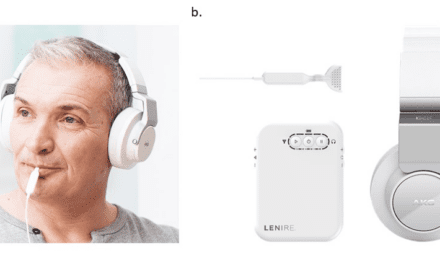January 16, 2008
The largely unknown physiological mechanisms behind tinnitus narrow treatment options for the condition, but new research published in the online open access journal BMC Biology shows how a method that can reduce tinnitus in some patients links the condition to brain activity.
Nina Kahlbrock of the University of Konstanz, Germany and Nathan Weisz of INSERM in Lyon, France investigated the relationship between the tinnitus sensation and spontaneous brain activity. Two techniques called tinnitus masking and residual inhibition involve using a sound that temporarily reduces tinnitus (masking). The effect sometimes continues after the masking sound has stopped (residual inhibition or RI). The researchers used RI to reduce eight sufferers’ tinnitus intensity, in an effect lasting approximately 30 seconds, coupled with source-space projected magnetencephalographic (MEG) data to track their brain activity.
Weisz had previously found that chronic tinnitus sufferers had different patterns of brain activity compared to those who had normal hearing. The brains of tinnitus sufferers showed reduced alpha power (8-12 Hz) and enhancement in the delta (1.5-4 Hz) and gamma power (>30 Hz) brainwave range. These differences were especially pronounced in the brain’s temporal cortical regions. In this research, slow wave brain activity was decreased during RI, but the higher alpha frequencies did not change.
"The results of this study suggest that a reduction of the tinnitus perception leads to changes in the oscillatory properties of cortical networks connected to tinnitus," says Kahlbrock. "In particular, changes in slow-wave frequencies appear to be RI related."
Treatment approaches would need to permanently interrupt the underlying oscillatory pattern to succeed. Further investigation into extending the RI approach could include combining it with top-down approaches such as neurofeedback to extend the RI tinnitus-dimming effect. Experiments to boost alpha frequencies and cut delta activity using neurofeedback have previously shown some success in reducing tinnitus.
"Transient reduction of tinnitus intensity is marked by concomitant reductions of delta band power"
Nina Kahlbrock and Nathan Weisz
BMC Biology
BMC Biology – the flagship biology journal of the BMC series – publishes research and methodology articles of special importance and broad interest in any area of biology and biomedical sciences. BMC Biology (ISSN 1741-7007) is covered by PubMed, Scopus, CAS, BIOSIS, Zoological Record and Google Scholar. The journal is tracked by Thomson Scientific (ISI) and will receive its first Impact Factor in 2008.
Source: Biomedcentral.com




